Disclosure: Meeple Mountain received a free copy of this product in exchange for an honest, unbiased review. This review is not intended to be an endorsement.
A lot can happen in a decade. Think back to 2010 when Barack Obama was in the White House, the UK was part of the European Union and LMFAO knew just how sexy they were. I was studying for a PhD in evolutionary biology, in a new relationship and on the limber side of 30; heady days where masks were for Halloween, Corona was a beer and the board game Pandemic was all the rage.
Around this time, a Russian biologist called Dmitry Knorre designed a fun card game as a novel gift for a friend’s birthday…
Looking back, it’s hard to see why evolution hadn’t been a more popular topic in games before; natural selection’s threads of development, expansion and competition are the perfect fodder for board games. Everything changed in 2010 with the releases of Dominant Species and Evolution: The Origin of Species, games that burst into an empty niche, a microcosm of the wider cardboard Cambrian explosion that has occurred in the hobby over the last decade. Whilst they tackle the subject matter in very different ways, both are landmark games in a thematic genre they helped to create.
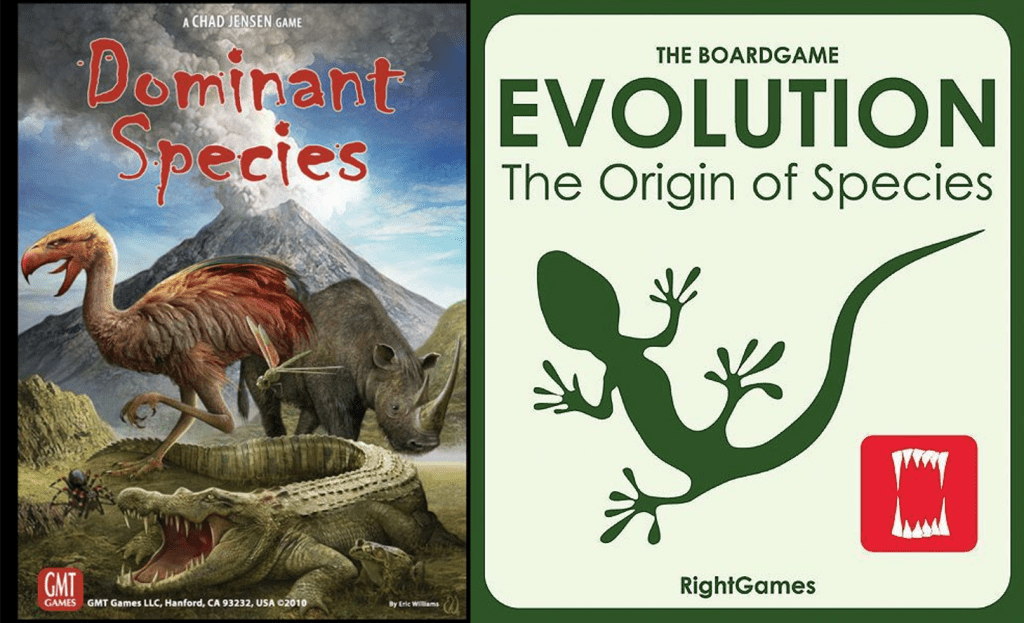
Few things, crocodilians aside, stay unchanged forever. Updated versions of both games, released to roughly coincide with their 10th anniversaries, now exist in a landscape irrevocably shaped by their parents and populated by their kin. 2021 saw the release of Dominant Species: Marine, whilst 2022 brings us Evolution: New World and, hence, this review.
The Evolutions of Evolution
It’s impossible to discuss Evolution: New World without understanding its family tree, so forgive a brief cladistics diversion.
First, there was Evolution: The Origin of Species, published by Rightgames RBG in 2010 and bolstered by five expansions, as well as the separate game Evolution: Random Mutations.
Then in 2014 US publisher North Star Games redesigned the original game, drafted in Catherine Hamilton to paint dreamy watercolour artwork and sliced 4 words from the title, releasing it as Evolution. North Star Games subsequently released an expansion, entry-level game Evolution: The Beginning, and expansion/standalone Evolution: Climate. 2020’s Oceans continued the series and the design is being reworked once again for 2023’s Nature.
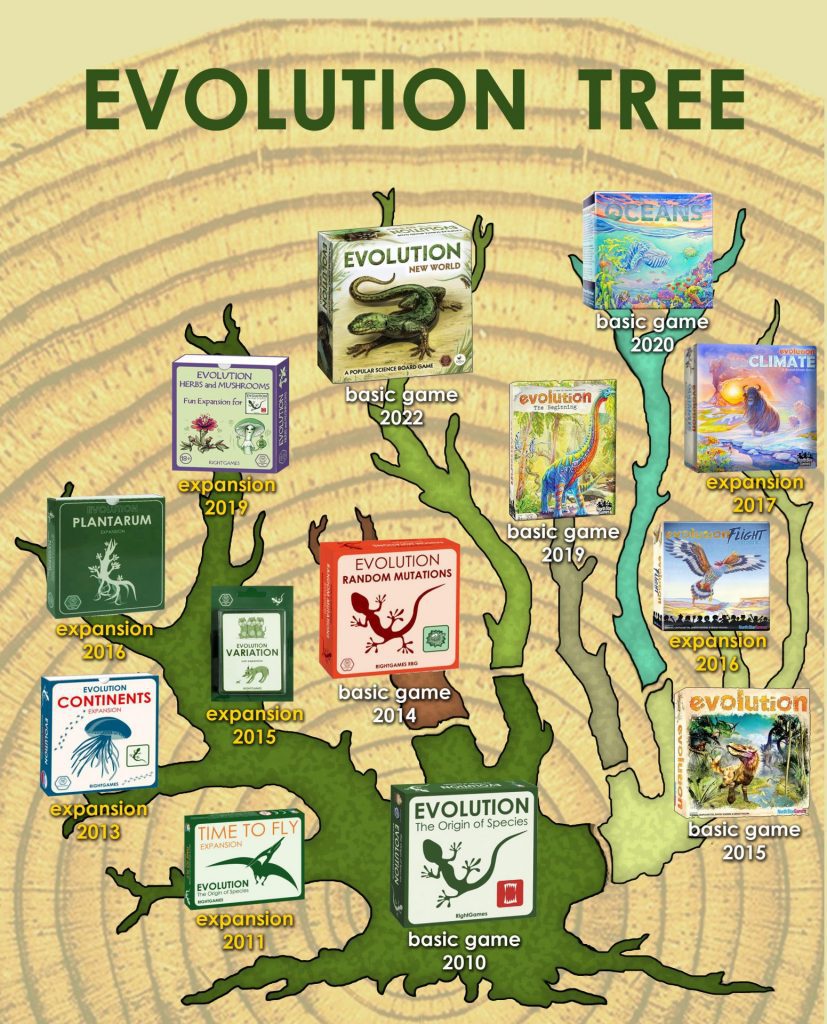
Now Rightgames RBG are back with Evolution: New World, streamlining the original and incorporating some of the best elements from those five expansions.
From little acorns grow mighty oaks but the simple way to think about the separate games with their homonymous names is by publisher – the twin branches of Rightgames RBG and North Star Games. It’s a split akin to humans and cats: genetically 90% the same but one has claws.
The Building Blocks of Life
The basic premise underlying all these games is the same: you play cards to create species of animals or mutate your existing species by giving them traits to help them compete for limited food. To get food, your animals might develop long necks, behave cooperatively or a host of other abilities. Or they might switch diets and start snacking on other species, leading to protective traits appearing around the table as everyone tries to avoid becoming dinner.
At its heart, away from the mechanistic differences between the various versions, the Evolution series is remarkably smart. You can grow apex predators, cooperating herbivores or anything in between. Betty’s animal looks easy pickings, so you give your species canines only for her meat snack to mutate and become poisonous. Meanwhile, Greg has set up a whole ecosystem, a single species feeding causing a cascade of follow up responses from the animals around it. Linda, on the other hand, has created a sacrificial species purely to sustain her own predator if times get tough.
There are more combinations of traits than there are names I can think of for fictional friends. The possibility space is vast, a cosmos of potential interactions stretching above the table.
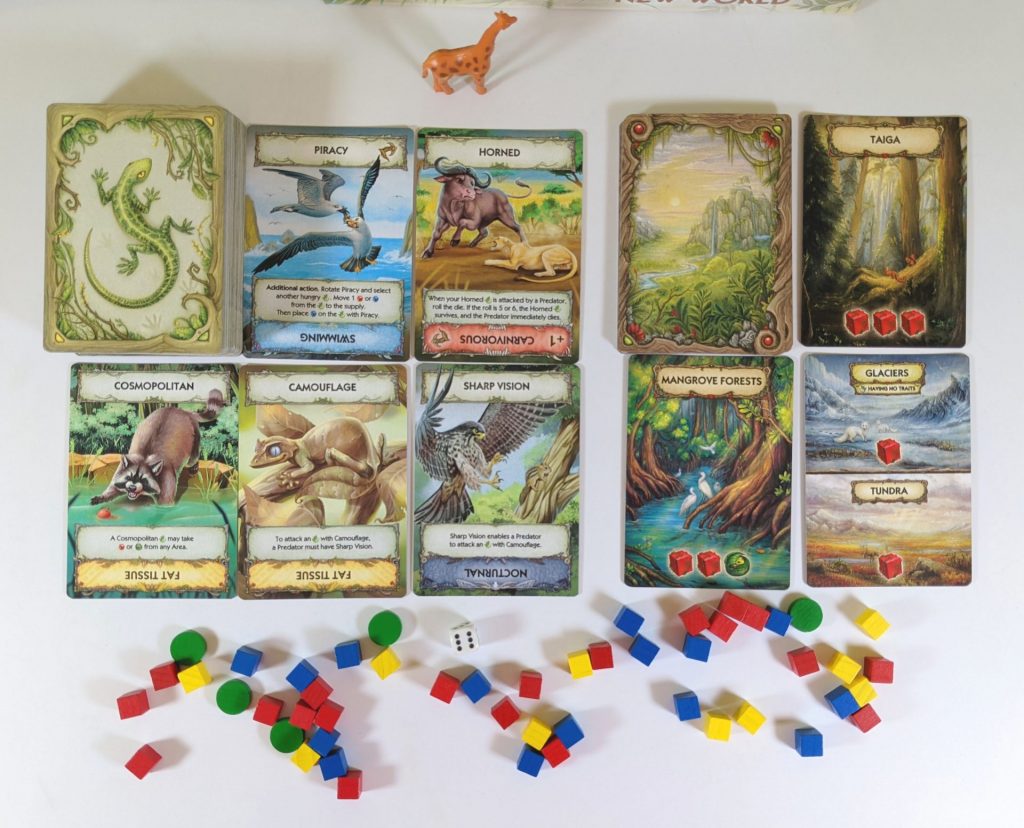
There are so many opportunities for clever plays, so many occasions where you can out manoeuvre your opponents and be outplayed in return. The subject matter is so familiar that anyone can understand it, intuitive comprehension making the games easy to learn and teach. Board games can be science communication tools and the Evolution series is the perfect example of this. Through its many iterations, the series confidently communicates ideas about evolution, stimulating thoughts about the complex interactions between organisms without sacrificing the fun.
A New World
Evolution: New World takes everything from the Rightgames RBG branch of the family tree and distils it into one very attractive package. Gone are the charmingly simple drawings from original designer Dmitry Knorre, replaced by some lovely naturalistic illustrations from Maria Efremova and Aleksandra Karenskaya. The game has the most expansive selection of animal traits seen in a base game of the series (Oceans’ unhinged ‘Deep Deck’ excluded), creating a feeling of even wider possibilities than before. And now your animals can find shelters as well as food, protecting them from predators for that round. It’s another small decision point to keep you on your toes.
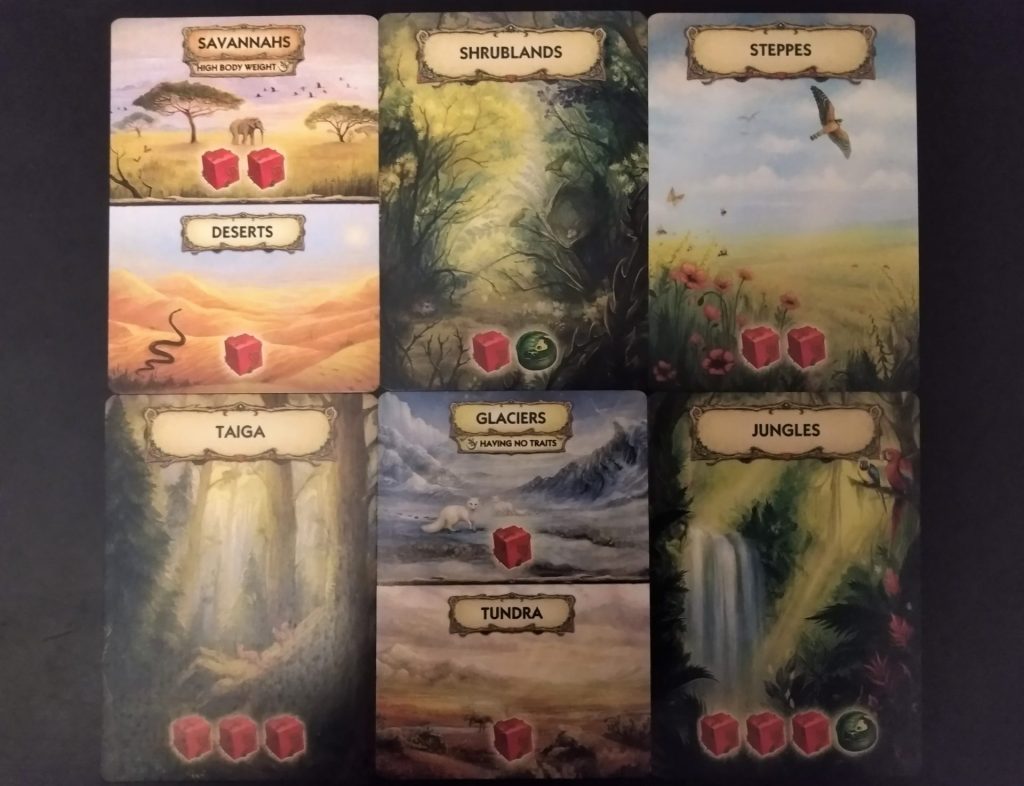
By far the most dramatic change is that food supply is no longer decided by a die roll (as in the original) or influenced by the players (as with most North Star Games’ implementations). Instead, food is determined by the cycling of habitats over epochs. Boreal forests and jungles might be especially bountiful biomes but if they’re followed by a period of tundra then your species will need to dance to the tune of the great habitat shuffle. The flipside of this need to keep up is that you can plan a few rounds in advance to take advantage of the changing landscape.
And it’s a good thing too, since the ability to plan is more important than ever. Let me tell you about the end game…
Winning at Life
Board games are abstractions, with artificial endings and victory conditions. With some settings it’s easy: in a game about financial investments, the person with the most money at the end wins. But what about games where the theme is more nebulous? In his fascinating article on theme and hubris, Marc Davies (The Thoughtful Gamer) asks a similar question: “how do you win at civilization?”
In a game about life (or civilisation), what are the win conditions, the goals and the victory points? There is no end point, no neat moment when things are over and scores are counted. And what would those scores represent anyway? Dinosaurs reigned for millennia but they’re some of life’s greatest losers.
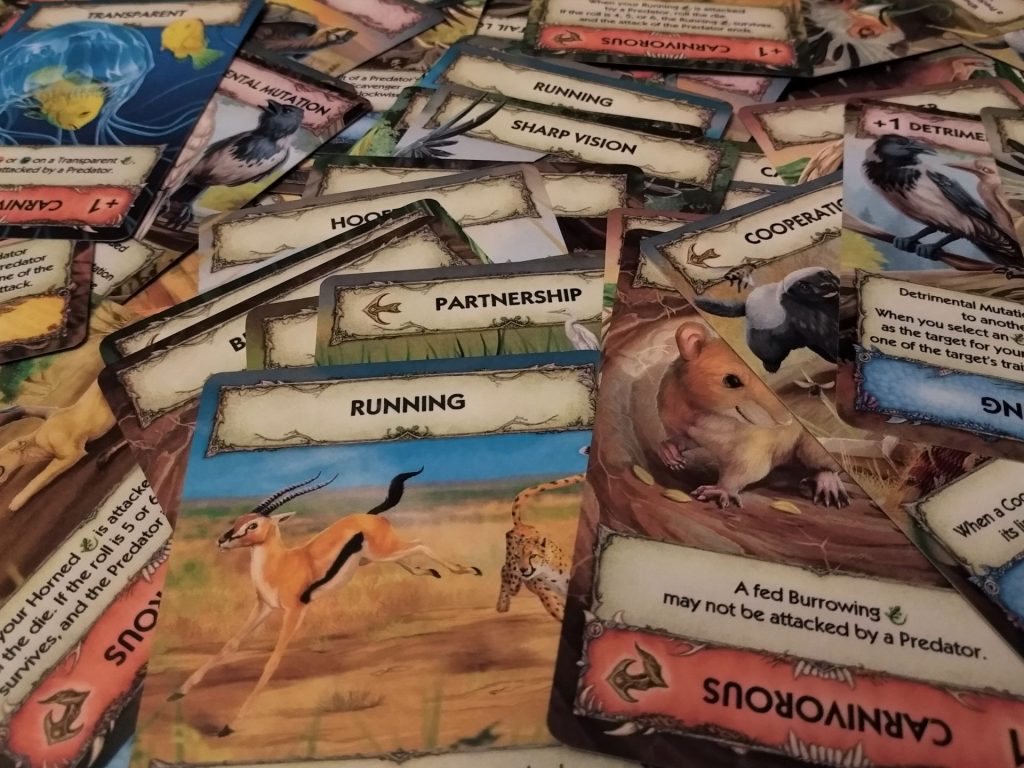
If the biological purpose of life is to reproduce, then points could be awarded for how well your lineage survives over the course of in-game generations or could be entirely decided by the state of play after a fixed amount of time. Dinosaurs might win in the first scenario but they certainly wouldn’t in the second.
It’s here where the divergence between publisher branches is most obvious, although not for the reasons you might assume.
The North Star Games branch takes the former approach – the bulk of your points come from food your species consume throughout the game (whether those species survived to the end or not). Evolution: New World, like the original game, takes the second approach, judging you entirely on the species and traits you have remaining when time is called.
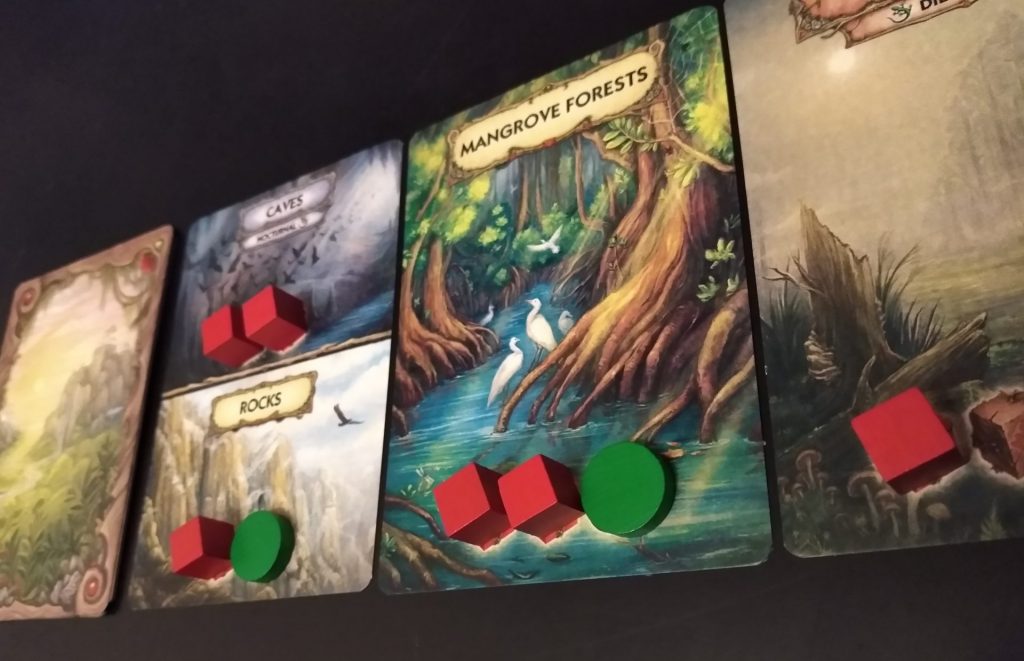
When Evolution: The Origin of Species was first released there were complaints that this ending wasn’t fair and that it made the early and mid-game pointless (pun intended). I couldn’t say with that game but with this new iteration I disagree. Since you need to have performed well enough throughout to stand a chance of entering the endgame in a decent state, the outcome of a game is likely be the same regardless of scoring approach. Whilst not a rigorous experiment, in testing my theory with games from both publishers, the same player won regardless of scoring method.
No, the divergence between the publishers is less about the fairness of the ending and more about the implications it has across the whole of the game and how it makes you feel. When everything comes down to the final round the stakes are much higher.
Red in Tooth and Claw
In changing the scoring and trying to create a more balanced experience, North Star Games defanged evolution. Their implementations are genuinely great but their highs and lows are far flatter, their arcs tend to plateau early on and, for all their clever play and wide open possibility space, they can occasionally feel ponderous, even staid.
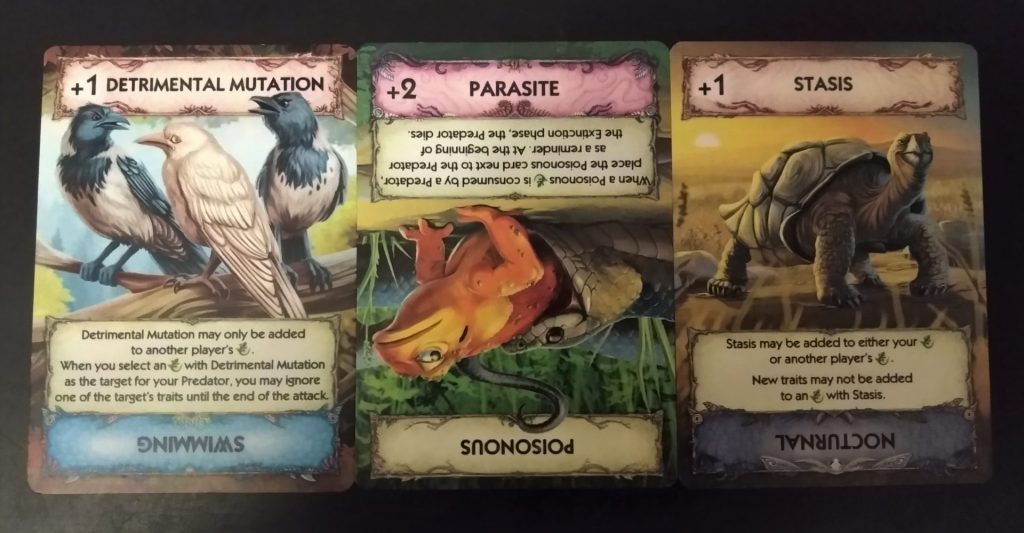
Not so Evolution: New World; at points it’s abrupt and shocking. Gone is the security of earning points as you go along. Gone is the buffer of a population that might recover from predation. Gone is the choice to pad the food bank at the start of each round. Whilst reviews of the North Star Games implementations always talk about confrontation and aggression, Evolution: New World shows just how much of a safety net those games actually provide.
Food is never plentiful, even with the best of habitats, forcing your species to grow fangs. Yet a successful carnivore attack will wipe a species from existence in one go, with (almost) no second chances. To help with this, cards have two traits to choose from and the deck feels more loaded towards aggressive and defensive abilities than ever. Your hand of cards feels like nature’s armoury, including parasites and detrimental mutations to ‘gift’ your opponents. Even the artwork, whilst gorgeous, is saturated with natural selection’s pitiless ferocity (just check out the illustrations for Scavenger and Voracious below).
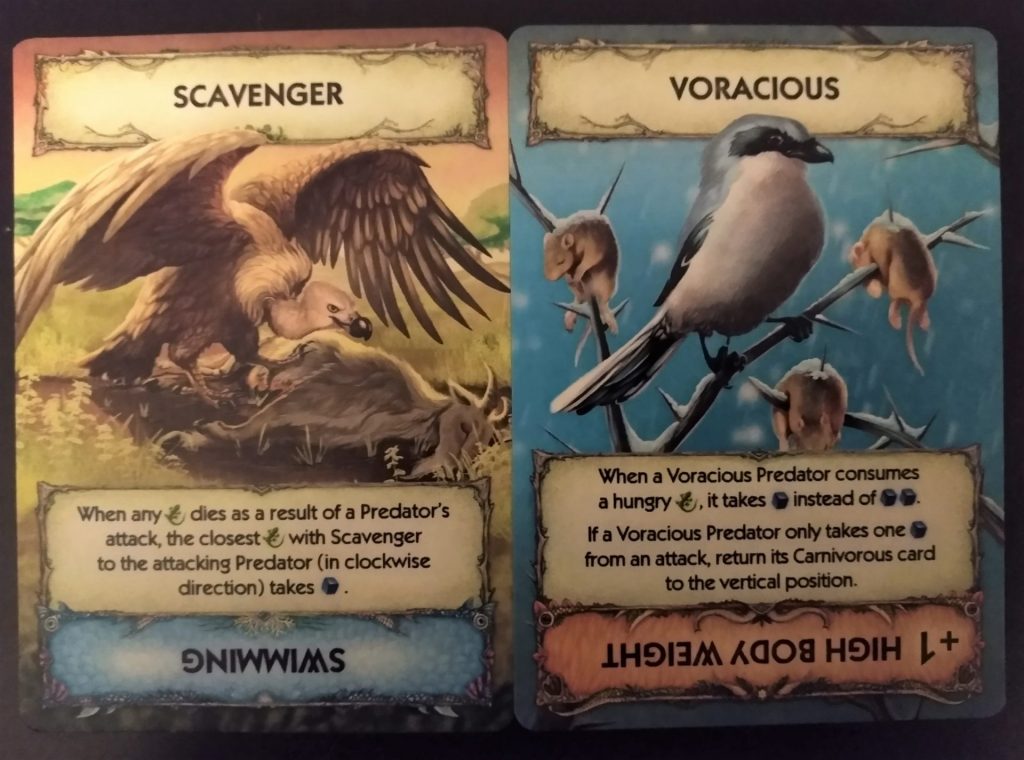
The result is a game that’s faster and more aggressive than its North Star Games cousins, one that builds to a higher crescendo and features a whole lot more drama. It’s funnier too, assuming you’re amused by both the downfall of your friends and some of the daft trait combinations possible (there’s no upper limit on the number of traits your species can have, leading to absurd mishmash animals). Surprisingly, it also isn’t especially ‘take that-y’, in the same way that war games aren’t ‘take that-y’ – conflict is at the very core of the game and even being infected with parasites can be turned to your advantage.
Cladistic Comparisons
More so than the North Star Games’ versions, Rightgames RBG’s Evolution: New World understands that evolution is competition. When a species finds a niche it expands until something stops it. Look at the impact of cane toads in Australia, signal crayfish in the UK or even the coronavirus. Who knew 10 years ago that we’d be living the board game we were playing back then?
I don’t think either publisher’s approach is superior. I like the pace and harshness of Evolution: New World, how cunning you can be, how gorgeous those cards are, and the excitement of those highs and lows. Having two traits per card is absolutely brilliant, you’re rarely in a tight spot with a hand of chaff. And I absolutely love how it ends with a bang, even if occasionally my final hand of cards doesn’t fall quite how I’d like it to or a friend figures out at the last minute how to snipe a species I was relying on.
At the same time, having played various North Star Games’ implementations first, I miss tinkering with population and body size, despite valuing the faster game play and deadly undercurrent that not having them affords. I miss seeing all that beautiful artwork on the table – as you place Evolution: New World’s lovely cards, the illustrations are hidden beneath other cards. It makes sense given the size of the cards and how many you might end up with but it seems a shame and it’s easy to forget what each trait does.
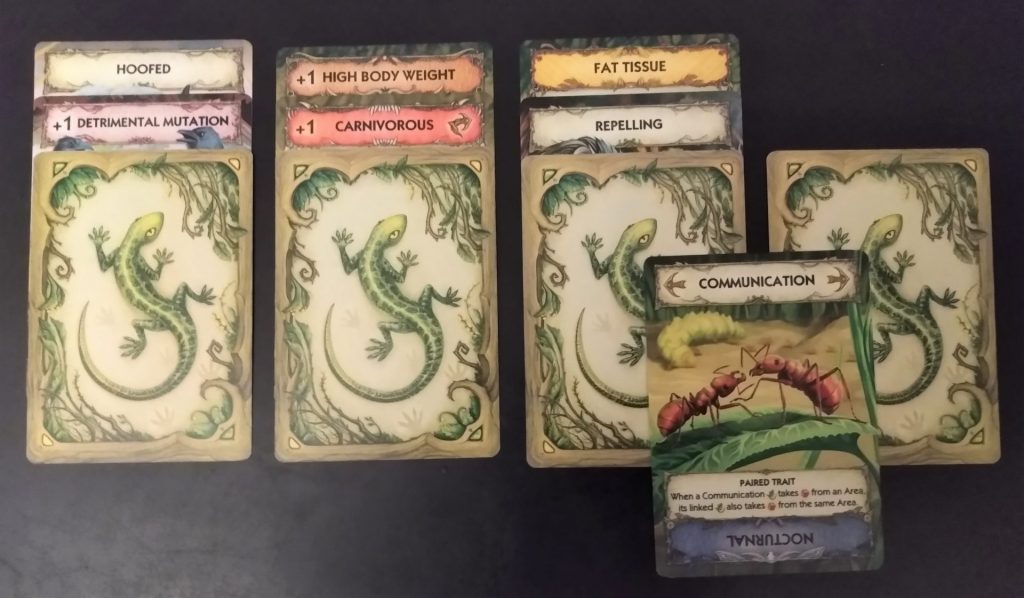
Curiously what I miss most is the chance to get attached to the species I’ve created. I like how species can be extinguished in a heartbeat and how dynamic the game is as a result, but it does mean that you don’t invest as much love in your critters (something that isn’t helped by hiding the artwork). Yes, I know extinction happens in the North Star Games iterations but it’s rarer and you generally have warning. When species are likely to survive several rounds I start giving them names and characters (this can’t just be me). When they’re liable to be snuffed out at any moment I’m less inclined to care.
The Evolution system remains as clever, fun and interesting as ever and Evolution: New World is a worthy entry to the series, with a refreshingly uncompromised approach to the realities of natural selection. It’s very good and if I don’t quite love it, I absolutely like and admire it. (I’m also ridiculously excited by all the additional traits that the planned expansion brings, both in terms of gameplay and biological significance – Anglerfish and Simplification are just two great examples of what the Rightgames team have planned.)
A Blink of an Eye
In evolutionary terms ten years is a blink of the eye, yet so much can happen. Just look at how divisive and charged US politics has become, look at the UK’s awkward split from the EU, and how, because of lockdown restrictions, Redfoo and SkyBlu’s party rocking is confined to their houses. A decade ago I couldn’t have imagined I’d change careers and plan my days around the school run. Back then forty was the number of spaces on a Monopoly board, not an age I’d be creaking ever closer to.
The Evolution series has come a long way since those first handmade birthday presents. Evolution: New World serves as both a celebration of just why the original game struck gold and a promising indication of where one branch of the series may go over the next 10 years.
Evolution: New World from publisher Rightgames RBG is currently on Kickstarter here and you can also read our interview with original designer Dmitry Knorre here.


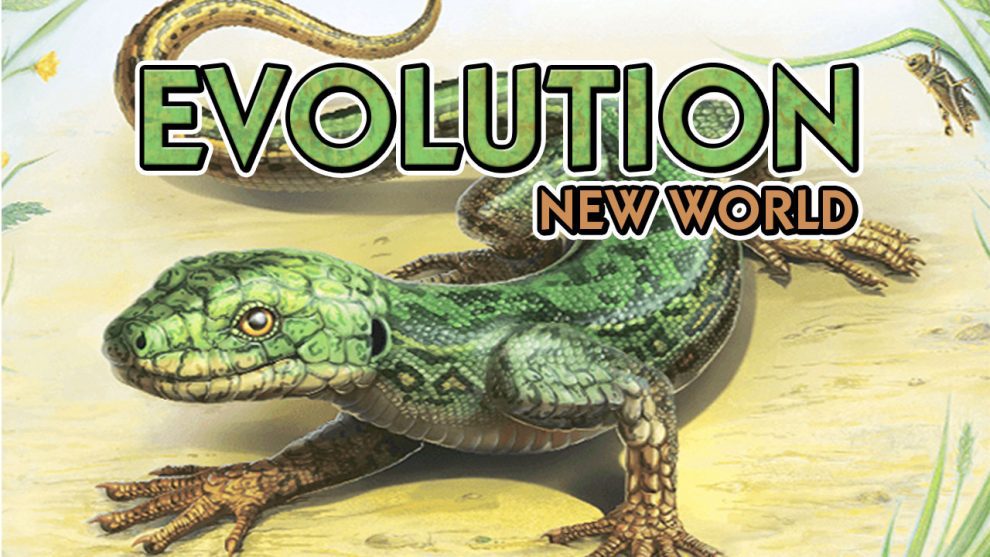


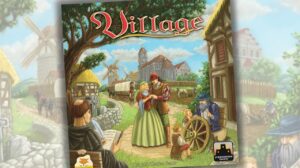

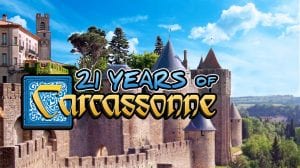




One of my favorite experiences playing the Evolution board game was during a game night with some close friends. We had all played the game before, so we were familiar with the basic mechanics, but this time we decided to add in some of the expansion cards to mix things up. As the game progressed, we each evolved our species in different ways, adding new traits and abilities that made them more successful in their respective niches.
As the game went on, the competition for food and space on the board became more intense, and we all had to make strategic decisions about which traits to add to our species and how to use them to gain an advantage. There were some tense moments where it looked like one of us might be wiped out by a predator or run out of food, but we all managed to adapt and survive in our own unique ways. We all had a lot of fun playing the game and trying out different strategies, and it was a great way to spend an evening with friends.
Before playing Evolution Board game, i read a random article about evolution board games from there
https://boardgamesuniverse.com/im-addicted-to-board-games-and-my-current-favorite-is-evolution-board-game-its-a-game-about-survival-of-the-fittest-and-i-love-the-challenge-it-presents/